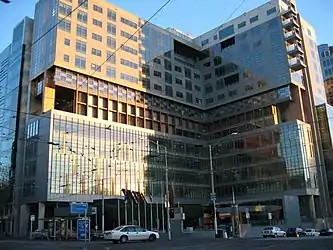Federal Court of Australia
The Federal Court of Australia is an Australian superior court of record which has jurisdiction to deal with most civil disputes governed by federal law (with the exception of family law matters), along with some summary (less serious) criminal matters. Cases are heard at first instance by single Judges. The Court includes an appeal division referred to as the Full Court comprising three Judges, the only avenue of appeal from which lies to the High Court of Australia. In the Australian court hierarchy, the Federal Court occupies a position equivalent to the Supreme Courts of each of the states and territories. In relation to the other Courts in the federal stream, it is equal to the Family Court of Australia, and superior to the Federal Circuit Court. It was established in 1976 by the Federal Court of Australia Act.
| Federal Court of Australia | |
|---|---|
 | |
 In Melbourne, the Federal Court is housed with other federal courts such as the High Court and the Federal Circuit Court of Australia in the Federal Court Building on the corner of La Trobe Street and William Street | |
| Established | 1976 |
| Coordinates | 33°52′8″S 151°12′42″E |
| Authorized by | Constitution of Australia Federal Court of Australia Act 1976 |
| Appeals to | High Court of Australia |
| Website | www |
| Chief Justice | |
| Currently | James Allsop |
The Chief Justice of the Federal Court is James Allsop.
Jurisdiction
The Federal Court has no inherent jurisdiction. Its jurisdiction flows from statute.[1][2] The Court's original jurisdiction include matters arising from Commonwealth legislation such as, for example, matters relating to taxation, trade practices, native title, intellectual property, industrial relations, corporations, immigration and bankruptcy.[3][4]
The Federal Court of Australia also has appellate jurisdiction from the Federal Circuit Court of Australia on all matters, with the exception of family law, where the Family Court of Australia has appellate jurisdiction.[5] The Court also exercises general appellate jurisdiction in criminal and civil matters on appeal from the Supreme Court of Norfolk Island;[3][4] and exercises appellate jurisdiction in appeals from State Supreme Courts in some federal matters.[6] Other federal courts and tribunals where the Court exercises appellate jurisdiction include the Australian Sports Anti-Doping Authority[7] and the Australian Human Rights and Equal Opportunity Commission.[8]
It also has the power to interpret the Constitution.[9]
Related courts
The jurisdiction of the Federal Court of Australia includes the jurisdiction exercised by two former federal courts, the Federal Court of Bankruptcy and the Commonwealth Industrial Court.
Federal Court of Bankruptcy
The Federal Court of Bankruptcy had jurisdiction in bankruptcy matters and was created in 1930.[10] The jurisdiction in bankruptcy was transferred to the Federal Court of Australia on its establishment in 1977.[11]
Commonwealth Industrial Court
The Commonwealth Industrial Court was established in 1956 as a result of the Boilermaker's case,[12] where the High Court held that a Chapter III Court could not exercise a non-judicial power, the arbitral function, because of the constitutional separation of powers in Australia.[12] The judicial functions were given to the newly created Commonwealth Industrial Court and the arbitral functions were given to Commonwealth Conciliation and Arbitration Commission.[13]
The Court was renamed the Australian Industrial Court in 1973.[14] In 1977 the jurisdiction of the Australian Industrial Court was transferred to the Federal Court of Australia.[15]
Industrial Relations Court of Australia
In 1993 the industrial relations jurisdiction of the Federal Court of Australia was transferred to the Industrial Relations Court of Australia,[16] and transferred back to the Federal Court of Australia in 1996.[17] The last judge of the Industrial Relations Court, Anthony North, retired in September 2018.[18]
Current judges
- Sydney
- Steven Rares (2 February 2006)
- Geoffrey Flick (15 October 2007)
- Nye Perram (8 August 2008)
- Jayne Jagot (3 September 2008)
- John Nicholas (16 November 2009)
- David Yates (30 November 2009)
- Anna Katzmann (1 February 2010)
- John Griffiths (23 April 2012)
- Kathleen Farrell (5 December 2012)
- James Allsop (1 March 2013) (Chief Justice)
- Michael Wigney (9 September 2013)
- Melissa Perry (23 September 2013)
- Jacqueline Gleeson (15 April 2014)
- Brigitte Markovic (24 August 2015)
- Robert Bromwich (29 February 2016)
- Stephen Burley (23 May 2016)
- Michael Lee (23 April 2017)
- Thomas Thawley (14 February 2018)
- Angus Stewart (25 February 2019)
- Wendy Abraham (7 May 2019)
- Melbourne
- Susan Kenny (16 October 1998)
- John Middleton (7 August 2006)
- Mordecai Bromberg (7 December 2009)
- Bernard Murphy (13 June 2011)
- Iain Ross (1 March 2012) (also President of Fair Work Commission)
- Jennifer Davies (4 July 2013)
- Debra Mortimer (12 July 2013)
- Jonathan Beach (30 June 2014)
- Mark Moshinsky (3 November 2015)
- David O'Callaghan (1 February 2017)
- Simon Steward (1 February 2018)
- Michael Wheelahan (3 October 2018)
- Elias Anastassiou (1 February 2019)
- Michael O’Bryan (26 February 2019)
- John Snaden (29 April 2019)
- Stewart Anderson (6 May 2019)
- Brisbane
- Andrew Greenwood (4 August 2005)
- Berna Collier (8 February 2006)
- John Logan (27 September 2007)
- John Reeves (15 October 2007; based in Darwin until March 2009)
- Darryl Rangiah (13 August 2013)
- Roger Derrington (24 April 2017)
- David Thomas (27 June 2017) (also President of the Administrative Appeals Tribunal)
- Sarah Derrington (10 January 2018) (also President of the Australian Law Reform Commission).
- Perth
- Neil McKerracher (15 October 2007)
- Katrina Banks-Smith (12 February 2018)
- Craig Colvin (13 February 2018)
- Darren Jackson (20 March 2019)
- Adelaide
- Anthony Besanko (3 April 2006)
- Richard Conway White (31 August 2013)
- Natalie Charlesworth (1 March 2016)
- Hobart
- Duncan Kerr (10 May 2012)[19]
References
- Section 39B of the Judiciary Act (1903) (Cth)
- Section 19 of the Federal Court of Australia Act 1976 (Cth).
- "The Court's Jurisdiction". Federal Court of Australia. November 2015.
- Justice SC Kenny (28 October 2011). "The Evolving Jurisdiction of the Federal Court of Australia". Federal Court of Australia.
- Sections 24 (civil) and 30AA (criminal) of the Federal Court of Australia Act 1976 (Cth).
- see for example section 565 of the Fair Work Act 2009.
- "James Hird's Federal Court appeal against ASADA investigation dismissed". ABC News. Australia. 30 January 2015. Retrieved 10 May 2016.
- B.M.S. vs Australia, CERD/C/54/D/8/1996, cl. 2.6 (Committee on the Elimination of Racial Discrimination 12 March 1999) ("The Australian Government and the AMC appealed the decision of the HREOC. On 17 July 1996, the Federal Court of Australia ruled in their favour.").
- "Judiciary Act 1903". www.legislation.gov.au. Canberra, Australia: Parliament of Australia. 2018. Retrieved 1 December 2019.
- Bankruptcy Act 1930 (Cth).
- Bankruptcy Amendment Act 1976 (Cth).
- Boilermaker's case [1956] HCA 10, (1956) 94 CLR 254.
- Conciliation and Arbitration Act 1956 (Cth).
- Conciliation and Arbitration Act 1973 (Cth)
- Federal Court of Australia (Consequential Provisions) Act 1976 (Cth).
- Industrial Relations Reform Act 1993 (Cth).
- Workplace Relations and Other Legislation Amendment Act 1996 (Cth).
- "Ceremonial Sitting of the Full Court to Farewell the Honourable Justice North", fedcourt.gov.au, retrieved 18 September 2018
- "List by appointment date of current judges". Federal Court of Australia. Retrieved 14 May 2019.